Intrige
Intrige (Originalregel)
Preparazione del gioco
With /join, 4 to 5 players can join the game. The game begins with /start. Alternatively, you can use the game administration.
Each player receives a house with a garden and ten playing pieces (five different pieces, two each)
Course of the game
Each player must complete three consecutive partial turns per round.
- Collecting income
- Taking other players' pieces into your own house .
- Sending your own pawns to other people's houses .
Collect income

At the start of his turn, a player receives the income corresponding to the areas from the bank for all his playing pieces that he has placed in other players' houses. This is done automatically by the game server.
Only each player's own ducats are known, the ducats of the other players are secret. (No income can be collected in the first round of the game as there are no playing pieces in the houses yet)
Pick up foreign pawns

In the second part of his turn, a player must take all the pawns that his fellow players have placed in the park into his house (with the exception of conflicts). The areas in which he places the pawns depend, among other things, on the bribes that the other players concerned now pay him: the first player (clockwise in turn) who has placed a pawn in the park must select a bribe in the top left-hand corner.

Click on the + sign to display the amount under the pawn in the park. Click on Ok to pay the amount to the person to be bribed.
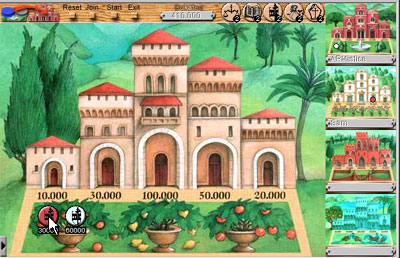
The bribe must amount to at least 10,000 ducats or any multiple thereof. After all players involved have paid their bribes to the landlord, the landlord adds the game pieces to his house by dragging and dropping the tiles one after the other to the desired areas. It is important to note that only one playing piece may be in an area at any one time.
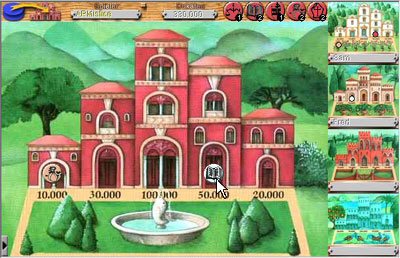
The landlord takes his time to think through all the important aspects (the amount of the bribes, the possible hints, wishes or even threats of his fellow players, his own intentions and much more) and then - completely at his own discretion and regardless of the bribes or any previous agreements! - to various free areas of his house. This second part of his first turn is also omitted for the starting player, as there are no pieces in his park yet.
Conflicts
Since each profession may only be represented once in a house, conflicts between characters of the same profession occur time and again.
After all non-conflicts have been resolved, the conflicts are then decided.
External conflict
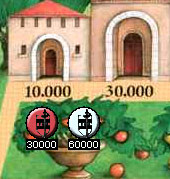
First, the rather rarely occurring external conflict is resolved, i.e. the one in which no character in the house is affected, but only several characters of the same profession speculate on taking over an area in the park.
Here too, the seating order determines who has to bribe first. After all participants have paid, the landlord places a piece in an area using drag & drop; all other pieces involved in this dispute are automatically banished and can therefore no longer be used for the rest of the game.
Internal conflict
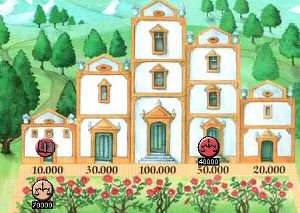
Finally, the more common internal conflict is decided, i.e. the one in which a character already in the house is attacked from the park by one or more characters of the same profession. In this case, the player whose piece is attacked in the house must pay another bribe to the lord of the house, always first. Then his attackers pay in seating order. The landlord then decides whether the defender or one of the attackers takes over this area, thus displacing the previous player. All losing pieces are banished for the rest of the game.
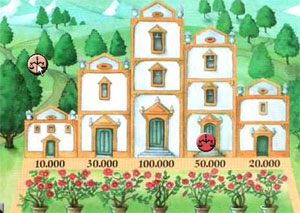
If you want to deploy an attacker from the park, drag and drop it onto the area where the defender is sitting. This is then automatically banished.
If you want the defender to remain seated, drag the lost attacker to the left behind the house, where it will be banished.
If there are several inner conflicts, first the lowest-paying one is resolved, then the next highest, etc., until finally all conflicts have been resolved and there is no piece left in the park.
Send out two of your own playing pieces
In the third part of their turn, a player must always bring any two pawns from their stock into play. These pieces may never be sent to just one other player, but are always sent to two different houses.
They are dragged and dropped onto one of the other players' game boards. There they wait to be picked up by the other players. Playing pieces can never be placed in your own palace.
There are no further restrictions. In particular, players do not have to distribute their pawns evenly. Over several rounds, for example, up to five pawns of one player can be placed in one and the same courtyard.
You cannot, however, place the same piece in the same house again, so that you would be attacking yourself.
In the sixth and final round, the third part of the turn is omitted for all players, as all pieces have already been placed in play.
Indicatore di Stato

ARMistice is up and must send out

Sam is up and has to put out of his garden into his house.

ARMistice must bribe

Fred will have to wait.
The status display at the top left shows which action currently needs to be performed:
- whoever is yellow, it is currently their turn
- whoever is blue must bribe right now
- whoever is gray has to wait
Fine del gioco
The game ends after the sixth round. Each player then receives the corresponding income once again for all figures in houses.
The player who has collected the most ducats wins.
Consigli tattici
So listen to some more tricky tips:
Do not miss any opportunity to interfere in every conversation, every negotiation, every argument. Ask, threaten, nag, hustle, plead, demand, expect, argue, take advantage wherever you can - the main thing is that it works in your favor!
Make as many agreements and promises as you want - as long as you are the first to break them! But also remember the motto "One hand washes the other". Fairness and reliability at the right time can show just as much success.
Place your characters carefully. Pay attention to which pieces the other players still have in stock. Protect your chances of successfully attacking somewhere. But refrain from doing so if the chances are slim. Distribute the foreign figures in your house carefully. Try to collect as many bribes as possible.
And always remember one thing: it's only a game!
So make up afterwards!

